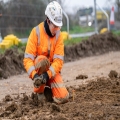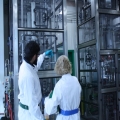Adrienne Kelbie, Independent Chair of Nuclear Waste Services (NWS), had what many would consider an unconventional start in the world of nuclear. Working as an administrative temp, she worked her way through varied roles that taught her career skills like financial and project management, governance and operational delivery, arriving as Chief Executive Officer for the Office of Nuclear Regulation in 2016.
I was taught that you can do anything with the right mindset and hard work. Just as some roles require a degree, there are many which do not. And I encourage people to consider apprenticeships as being as a valid a route to great roles as degrees. Because there are lots of people, like me, who take a less traditional career – so long as they have mindset that is truly about lifelong learning. And there is more choice than ever before, for apprentices, to get into a career that may twist and turn through many fulfilling opportunities, as mine has.
Apprentices can fill the nuclear skills gap.
The nuclear industry is growing. The UK Radioactive Waste Inventory has 4,560,000 m3 of radioactive waste. And all of it requires careful management. Nuclear Waste Services’ (NWS) vision and mission is vitally important to the UK today and for future generations. We’re here to make nuclear waste permanently safe, sooner, and our mission is to become the ‘one-stop shop’ for the management of nuclear waste in the UK.
The UK has been producing and managing nuclear waste for many decades and will continue to do so for many more. The ability to safely manage and dispose of nuclear waste today and for future generations is crucial.
That’s why the Nuclear Skills Strategy Group (NSSG) was set up. It brings together major employers from across the nuclear industry to look at the skills we need to grow. While there are a wide range of roles from engineering and science to project management and finance, it’s clear there will be a future skills shortage as more jobs open up.
We find it especially difficult to recruit for programme and project management. A lot of people think you need to be a scientist to work in nuclear, but we don’t all wear a lab coat to work. And you needn’t even be an engineer – much as they are the lifeblood of our mission. Rather, there is a place for everyone because we all ultimately contribute to that mission, whether in an admin role, or as a CEO.
The NSSG forecasts a 49% growth in the nuclear sector by 2030, on top of the 80,000 workforce already employed . So now, more than ever before, is where there is a demand and need for apprenticeships. Each year the NDA invests over £45 million in apprentice and graduate development , across over 1,000 colleagues in our early careers programme.
It’s all about putting people in a role where they can learn on the job and build skills for life. I always encourage our apprentices to ask questions and watch how things really get done. Learn about working with others. Find out how to the kind of colleague that everyone wants to help and work with. The more apprentices – and everyone else! – adopts a way of working that notices this, the better their skills development throughout a career. The relationship skills our apprenticeships develop at this early stage will determine the trajectory of their careers.
…and be a part of something bigger.
Apprentices are vital of the nuclear family. This is why NWS has chosen to commit heavily to our successful and well-established apprenticeship scheme. We help apprentices to learn and develop the lifelong skills they need while surrounded by industry and subject experts. They’re also given tangible opportunities to develop through avenues such as professional training qualifications, community support placements, STEM learning opportunities with local schools and chances to support our experts on business projects.
We’re training a group of highly skilled employees who we want to stay with us and contribute to our legacy of world class waste management, and in turn support the future of new nuclear which can support sustainable energy. We need people of all ages, from different backgrounds, who bring exposure to modern thinking and technology and have a great attitude to learning and working hard.
NWS apprentices tend to achieve long-term positions within the organisation at the end of their apprenticeship.
Our apprentices can choose to become anything. Instead of working on elements of work they’ll never see again, they could be a part of something with an international legacy. And I’m really curious and inspired by what our apprentices of today will do tomorrow. They might just be the group who imagine a solution to some of our biggest challenges!
So, here’s why you should join the nuclear sector
The nuclear sector has ambitious goals like supporting the UK’s journey towards net zero and managing major infrastructure projects like the Geological Disposal Facility (GDF) Programme. These projects stretch across generations. That means we need the right skills and the right people not just now, but throughout a nuclear lifetime, which could be upwards of 100 years.
That’s why our apprenticeships programmes, group graduate schemes and our training programmes are essential. We want to bring young people into the sector, train them and get them out into the workforce. We especially want to see gender balance too, and I want to encourage everyone who feels that working in an engineering-based sector is not for them, to realise that it’s exactly for them – we need diversity to thrive!
We’re driven by making a real difference and making an impact at an international level. We’re also really learning centred with a knowledge sharing culture. We have lots of online learning programmes you can do yourself alongside your apprenticeship. And we’re always upskilling employees with university degrees and leadership programmes to build their lifelong skills. There’s a real generosity of spirit at NWS because our people know it takes a whole family to succeed. Perhaps you’ll join us?
- 69 views








